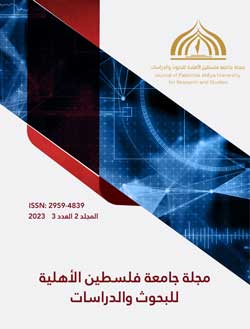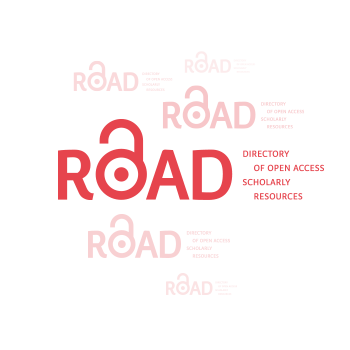استخدام الواتس آب في تدريس المفردات: دراسة حالة من فلسطين
DOI:
https://doi.org/10.59994/pau.2023.3.14الكلمات المفتاحية:
اللغة الإنجليزية كلغة أجنبية، تطبيق الهاتف المحمول، تعليم ابتدائي، تعلم المفردات، تعليم المفردات، الواتس آبالملخص
أصبحت تطبيقات المراسلة مشهورةً بين طلاب القرن الحادي والعشرين في جميع أنحاء العالم، وفي فلسطين على وجه الخصوص. تعدُّ هذه التطبيقات مفيدة في تدريس جميع التخصصات، واللغة الإنجليزية على وجه الخصوص. سعت هذه الدراسة إلى معرفة تأثير استخدام تطبيق WhatsApp في إثراء مفردات طلاب المدارس الابتدائية. تكوّنت عينة الدراسة من (20) طالبًا في الصف السادس (10 ذكور و10 إناث) من مدارس العمرية الخاصة في نابلس. واعتمدت الدراسة طريقة المجموعة التجريبية الواحدة، فأُجري اختبار قبلي لتقييم مستوى الطلاب في معرفة المفردات والتأكّد من التجانس بين مستويات الطلبة. بعد ذلك، تلقّى طلاب المجموعة التجريبية تعليمات حول مفردات التدريس وأصوله من خلال رسائل الواتس آب، والتي تضمنت صورًا ونصوصًا وفيديوهات، لمدة ثلاثة أيام في الأسبوع على مدار شهرين، وأُجري اختبار بعدي للمجموعة التجريبية لقياس تأثير استخدام تعليمات WhatsApp على معرفتهم بالمفردات والفرق بين الجنسين أيضًا. أظهرت النتائج أن استخدام WhatsApp كان له تأثير كبير في تحسين مستوى تعلّم المفردات لدى الطلاب. كما أظهرت وجود فروق في تأثير استخدام الواتس آب في تعليم المفردات بين الجنسين لصالح الذكور. في ضوء هذه النتائج، يوصي الباحثون ضرورة استخدام رسائل WhatsApp في المدارس الخاصة والحكومية. أسهمت هذه الدراسة في زيادة وعي الطلبة والأساتذة ومصممي المناهج لأهمية توظيف الواتس آب في التعليم والتعلّم، وأسهمت أيضًا في تعريف الطلبة باستراتيجيات وتقنيات جديدة لتعلّم مفردات اللغة الإنجليزية في بيئة تزيد من دافعية الطلبة وتعزز تعلّمهم الذاتي في أي مكان وزمان ووفق سرعتهم الخاصة، كما أن الدراسة قد تسهم في تعريف الباحثين الأجانب على واقع السياق التعليمي الفلسطيني وإمكانياته مما قد يؤدي إلى التعاون المشترك في المستقبل.
التنزيلات
المراجع
Ahmed, S. (2019). WhatsApp and Learn English: A Study of the Effectiveness of WhatsApp in Developing Reading and Writing Skills in English. ELS Journal on Interdisciplinary Studies in Humanities, 2 (2), 148-156. https://doi.org/10.34050/els-jish.v2i2.6419
Ajid, L. H., Reni, R. I., Yunita, D. U., & Dwi, S. U. (2018). The Use of WhatsApp in Collaborative Learning to Improve English Teaching and Learning Process. International Journal of Research Studies in Educational Technology,7(1), 29-35. DOI: 10.5861/ijrset.2018.3004
Alhawiti, M. (2015). The Effect of Mobile Language Learning on ESP Students’ Achievement. Journal of Modern Education Review. 5(3), 272–282. DOI: 10.15341/jmer(2155-7993)/03.05.2015/007
Al-saleem, B. (2013). The Effect of "WhatsApp" Electronic Dialogue Journaling on Improving Writing Vocabulary Word Choice and Voice of EFL Undergraduate Saudi Students. Arab World English Journal,4(3), 213-225
Annamalai, N. (2019). Using WhatsApp to Extend Learning in A Blended Classroom Environment. Teaching English with Technology, 19 (1), 3-20.
Alshammari, R. A., Parkes, M. I. & Adlington, R. A. (2017). Using WhatsApp in EFL Instruction with Saudi Arabian University Students. Arab World English Journal, 8 (4), 3-22. DOI: https://dx.doi.org/10.24093/awej/vol8no4.5
Basal, A. H., Yilmaz, S. E., Tanriverdi, A. S. and Sari, L. U. (2016). Effectiveness of Mobile Applications in Vocabulary Teaching. Contemporary Educational Technology, 7(1), 47-59. DOI: 10.30935/cedtech/6162
Bensalem, E. (2018). The Impact of WhatsApp on EFL Students' Vocabulary Learning. Arab World English Journal, 9(1), 23- 38. DOI: https://dx.doi.org/10.24093/awej/vol9no1.2
Cetinkaya, L., & Sütçü, S. S., (2016). Parents' Restrictions on Their Children's Use of Information Technologies and Their Reasons. Turkish Online Journal of Qualitative Inquiry, 7(1), 18-36.
Cetinkaya, L. (2017). The Impact of WhatsApp Use on Success in Education Process. International Review of Research in Open and Distributed Learning, 18(7), 59-74. https://doi.org/10.19173/irrodl.v18i7.3279
Fattah, S. (2015). The Effectiveness of Using WhatsApp Messenger as One of Mobile Learning Techniques to Develop Students' Writing Skills. Journal of Education and practice, 6(32), 115-127.
Gon, S., & Rawekar, A. (2017). Effectivity of E-Learning through Whatsapp as a Teaching Learning Tool. MVP Journal of Medical Sciences, 19–25. https://doi.org/10.18311/mvpjms.v4i1.8454
Hamad, M. (2017). Using WhatsApp to Enhance Students’ Learning of English Language Experience to Share. Higher Education Studies, 7(4), 74-87. DOI:10.5539/hes.v7n4p74
Harrison, M. A., & Gilmore, A. L. (2012). U txt when? College Students' Social Contexts of Text Messaging. The Social Science Journal, 49(4), 513–518. https://doi.org/10.1016/j.soscij.2012.05.003
Hashemifardnia, A. R., Namaziandost, E. H. & Esfahani, . A. (2018). The Effect of Using WhatsApp on Iranian EFL Learners’ Vocabulary Learning. Journal of Applied Linguistics and Language Research, 5(3), 256-267.
Jafari, S. A. & Chalak, A. Z. (2016). The Role of WhatsApp in Teaching Vocabulary to Iranian EFL Learners at Junior High School. English Language Teaching, 9(8), 85-92. DOI: 10.5539/elt.v9n8p85
Lenhart, A., Purcell, K., Smith, A., & Zickuhr, K. (2010). Social Media and Young Adults. Washington D.C., Pew Internet & American Life.
Li, Q. (2017). Characteristics and Social Impact of the Use of Social Media by Chinese. Drama Telematics Inform., 34(3), 797-810. DOI: 10.1016/j.tele.2016.05.020
Maddena, S., Janoske, M. and Briones, M. (2016). The Double-edged Crisis: Invisible Children’s SocialMedia Response to the Kony Campaign. Public Relat. Rev., 42(1), 38-48 https://doi.org/10.1016/j.pubrev.2015.10.002
Mahmoud, A. and Tanni, Z. (2014). Using Games to Promote Students' Motivation towards Learning English. Journal of Al-Quds Open University for Educational and Psychological Research and Studies, 2(5), 11-33. DOI: 10.12816/0016267
Raba’, A. & Herzallah, H. (2015). Effective Teaching from An-Najah National University M.A. Students’ Perspectives. Journal of Languages and Culture. 6(6), 52-60. DOI: 10.5897/JLC2015.0325
Raba', A. & Harzallah, H. (2018). Palestinian Teachers' Views on the Factors That Limit Students' Creativity and Some Possible Strategies to Overcome Them. Research in Social Sciences and Technology, 3(2), 40-57. DOI: 10.46303/ressat.03.02.3
Samaha, M. & Hawi N. (2017). Associations between Screen Media Parenting Practices and Children’s Screen Time in Lebanon. Telematics Inform, 34(1), 351-358. https://doi.org/10.1016/j.tele.2016.06.002
Susanto, A. (2017). "The Teaching of Vocabulary: A Perspective. Journal KATA, 1 (2), 182-191. http://dx.doi.org/10.22216/jk.v1i2.2136
Ta'amneh, M. (2017). The Effect of Using WhatsApp Messenger in Learning English Language among University Students. International Journal of Humanities and Applied Social Science, 2(2), 15-22. http://dx.doi.org/10.5296/ire.v5i1.10801
Taleb, Z. & Sohrabi, A. (2012). ‘Learning on the Move: The Use of Mobile Technology to Support Learning for University Students’. Procedia Social and Behavioral Sciences. 69:1102-1109. http://dx.doi.org/10.1016/j.sbspro.2012.12.038
Ur, P., Haim, O., Kluska, M., Plavin, S., Shlayer, J., Steiner, J. & Timna, L. (2014). A Practical Guide for Teaching Vocabulary, Jerusalem, Ministry of Education.

التنزيلات
منشور
كيفية الاقتباس
إصدار
القسم
الرخصة
الحقوق الفكرية (c) 2023 مجلة جامعة فلسطين الأهلية للبحوث والدراسات

هذا العمل مرخص بموجب Creative Commons Attribution 4.0 International License.
مجلة جامعة فلسطين الاهلية للبحوث والدراسات تعتمد رخصة نَسب المُصنَّف 4.0 دولي (CC BY 4.0)











